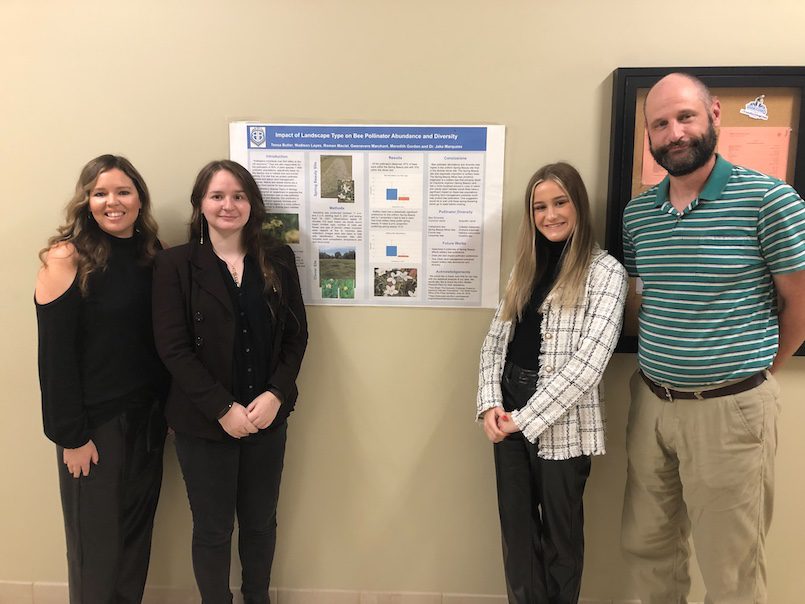10 Jan 2022 ASU-Beebe students conduct in-depth research experiment focusing on bee pollinators
BEEBE – Students in ASU-Beebe’s Special Topics in Biology class had a unique opportunity to participate in an in-depth research project last spring. Students designed an experiment from conception to conclusion to examine the impact of landscape type on bee pollinator abundance and diversity.
Dr. Jake Marquess, professor of biology, and Meredith Gordon, assistant professor of biology, said they wanted the class to offer students the opportunity to participate in the full research process that undergraduate and graduate students at a four-year university would go through with a direct relation to biology.

“Typically, students at a two-year college don’t get research opportunities,” Gordon said. “Even in a four-year university setting, research projects are reserved for seniors or students in specialized fields. We wanted to provide the opportunity for our students to have that same type of experience.”
Students conducted the experiment between April 5, 2021 and April 19, 2021. They predicted that bee pollinator species would be more abundant and diverse in a more uniform plant habitat than in diverse plant habitats. The group wanted to focus their project on a topic that had an element of community interest and one that could be conducted on campus a couple of hours per week.
“Our challenge was that we didn’t have a lot of time or resources. This was our first time teaching this course, so in many ways this project was very authentic. Students had to develop everything including the methodology, how to identify the plants and bees, and what information was important to include,” Marquess said.
Gordon said the group selected two areas on campus, one with similar plant life, and another with more diverse plant life to observe. Gwenevere Marchant and Madison Layes were two of the students who participated in the project. Marchant said students would observe the designated areas for an hour to an hour and a half. One student was charged with sighting a bee, while another would photograph the bee. Data such as the weather, time, and type of bee were recorded.
“It was strenuous, but a good process,” Marchant said. “It increased not only my appreciation for the bees but also the other students. We developed some great relationships.” She added the project exposed her to numerous resources such as online database that she was previously unaware were available to students.
Marchant said the students researched different methodologies to see if they could incorporate them into their project. “We did a lot of troubleshooting to see if they would work for us. We learned a lot through this process that we didn’t use in the project,” she said. Marchant earned her Associate of Science degree in Biology from ASU-Beebe and is now working toward a bachelor degree in Biology from the University of Central Arkansas. She hopes to work with the Arkansas Wildlife Division, as well as freelance as a wildlife illustrator.
Layes said that while she is not a fan of bees, the class gave her a new appreciation for the pollinators. “At first, I had no interest in plants or bees, but now I have an appreciation for them. We have a big impact on insects and their environments. Even our small group with this project, we are impacting the environment,” she said. Layes plans to attend pharmacy school at the University of Arkansas for Medical Science next fall. She said she felt the Special Topics in Biology course was applicable to all students no matter their degree focus. “No matter what your degree you’re working toward, you will have to do some sort of research. I think this class gave me a better understanding of the research process,” she said.
Marchant echoed Layes’s words, saying that she would recommend the class to any student. “It was fun and interesting. This class is probably the one I am most thankful for and will use in my career in the future,” she said.










